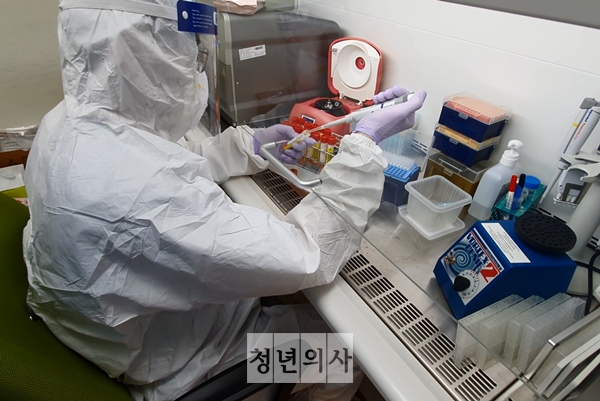The ongoing fourth wave of the coronavirus has sharply increased the need for Covid-19 tests, causing calls for introducing automation equipment. However, according to industry watchers, the lack of reagents for the automated facility will likely serve as a major stumbling block to automated testing.

The quarantine authorities and other related groups have pushed for introducing automation equipment since last year to ease work overload at testing sites. However, such efforts have gotten nowhere, as the volume of reagents that could be supplied to domestic institutions was fewer than 10,000 cases a day, the sources said.
Currently, healthy workers conduct 200,000 to 250,000 RT-PCR tests a day.
If the nation introduces automated equipment priced several hundred million won per unit and carried out only about 10,000 tests, some 5 percent of total checks, the machine’s economic effects will be a problem, they noted.
The manufacturers of automated test equipment of Covid-19 include Roche-diagnostics, Hologic, and Abbott, all of which are U.S. companies.
The Korean Society for Laboratory Medicine had done preparatory works, such as examining the number of diagnosis reagents that can be supplied to Korea, in meetings with these U.S. companies from last year till early this year. However, it was found that each of the three firms could provide only 3,000 cases a day, less than 10,000 in total.
Even this amount may not be available in a lump sum but would come in gradually increased volume until this year-end or early next year, according to the U.S. companies. They will have to prioritize supply to the U.S., which still sees 40,000 new virus cases a day, and other countries in similar situations.
“Three companies are manufacturing lab automation facilities worldwide. Korea has introduced about 20 units of Roche-diagnostics’ products with only a few institutions using the other two companies’ equipment,” said Professor Hong Ki-ho of the Laboratory Medicine Department at Severance Hospital, who also serves as the secretary of the society’s Covid-19 task force.
To provide some support, the society members met with the officials of these companies to discuss the reagent supply. Still, the companies said they could not supply sufficient reagents for use in Korea, he added.
“Around 200,000 Covid-19 tests are performed a day. However, the companies could not supply fewer than 10,000 cases a day. So the maximum amount that each company can supply per month was only 100,000,” Hong said.
It would be nice to carry out tests even during the night by implementing automation facilities. However, there are not enough diagnostic reagents in supply, he said. The cost of each unit reaches several hundreds of million won, quite burdensome for purchase. Aside from the price, the amount of reagents is not enough, making their use inefficient at the moment.
“We have discussed the possibility of emergency use authorization with the health authorities. However, even that was meaningless if the daily supply of reagents stops at 10,000 cases,” he said.
Professor Hong stressed that it is best to maximize the use of the sample collection testing method in the current situation.
“The collection testing may not be perfect, but it is the best solution at the moment. We could increase the number of test cases to 200,000 a day thanks to the sample collection method,” he said. “There are not enough personnel for sample collection at the moment, increasing the workload. The government should secure more sample collectors.”

